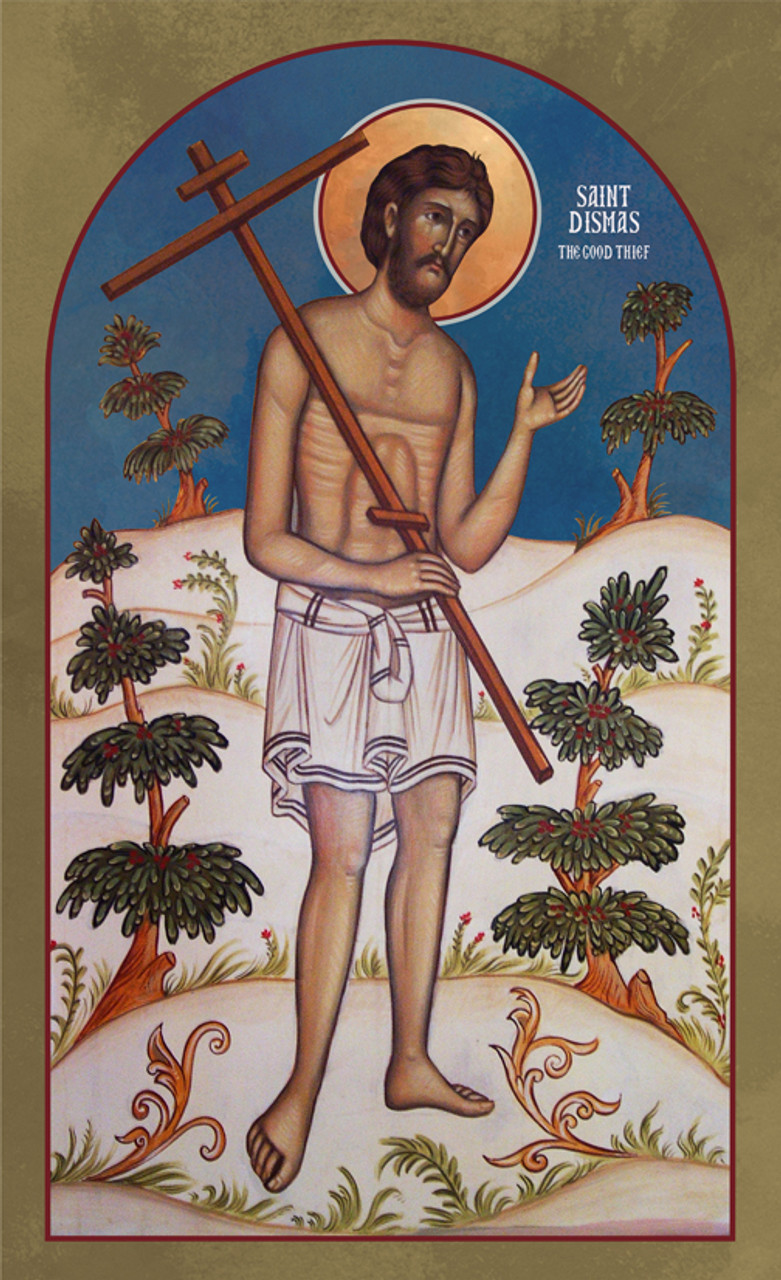Last Words: A Lenten Meditation on the Final Sayings of Christ, Week 3Sýnishorn

The Last Shall Be First

Saint Dismas: The Good Thief Icon, Anonymous Artist. Public Domain.
“Remember Me” from the album Resurrection Letters: Volume #1 by Andrew Peterson.
Poetry:
“To the Tax Collectors after the Bandits Retreat”
Yuan Jie translated by Kiang Kanghu
I still remember those days of peace --
Twenty years among mountains and forests,
The pure stream running past my yard,
The caves and valleys at my door.
Taxes were light and regular then,
And I could sleep soundly and late in the morning-
Till suddenly came a sorry change.
...For years now I have been serving in the army.
When I began here as an official,
The mountain bandits were rising again;
But the town was so small it was spared by the thieves,
And the people so poor and so pitiable
That all other districts were looted
And this one this time let alone.
...Do you imperial commissioners
Mean to be less kind than bandits?
The people you force to pay the poll
Are like creatures frying over a fire.
And how can you sacrifice human lives,
Just to be known as able collectors? --
...Oh, let me fling down my official seal,
Let me be a lone fisherman in a small boat
And support my family on fish and wheat
And content my old age with rivers and lakes!
THE LAST SHALL BE FIRST
Gracias has become one of the most essential terms in the Spanish language. After words like “papá” (dad) and “mama” (mom), “gracias” (thank you) is part of the everyday vocabulary of all Spanish speakers. In all cultures, expressing gratitude to others represents good manners and civil interaction. For this reason, parents teach their children to say thank you as part of their early education. In Spanish, gracias preserves the etymological root of the word “grace” that we miss in English. Sadly, even Spanish speakers tend to be reminded about grace's importance without reflecting on its meaning in their lives.
Grace is the foundational term for Christianity because it describes its unique distinctiveness. We are sinners separated from a holy God. There is nothing we can do to earn God’s favor or to erase our sin and its consequences from our lives. In our desperation, we discover an exceptional passage in the Scriptures that turns our world and our dire situation upside down:
“But because of his great love for us, God, who is rich in mercy, made us alive with Christ even when we were dead in transgressions—it is by grace you have been saved. And God raised us up with Christ and seated us with him in the heavenly realms in Christ Jesus, in order that in the coming ages he might show the incomparable riches of his grace, expressed in his kindness to us in Christ Jesus. Or is it by grace you have been saved, through faith—and this is not from yourselves, it is the gift of God.” (Eph. 2: 4-8), emphasis added).
Nobody deserves God’s favor, yet we receive it in Christ through His grace. Easter reminds us that we are all sinners in desperate need of God’s grace. Followers of Christ believe that salvation is a work of grace. However, many of us forget that the Christian life is also a result of God’s grace and act as if keeping God’s favor depends on our works. For this reason, we can tend to resemble the religious leaders who opposed Jesus. They thought their religious practices pleased God and merited His recognition for their piety. Consequently, they looked down on the sinners who didn’t live and behave like them.
If we are honest, many of us share a lot in common with the religious leaders who opposed Jesus and the vineyard workers who complained about the owner’s gracious behavior. Over time, we forget our sinfulness and start to believe that we deserve God’s grace. When this happens, we struggle to appreciate God’s grace for others and fail to extend it to them. For this reason, we need Easter to remind us that we are sinners in constant need of divine redemption, the last ones who always rely on divine grace, and the sick who require divine healing.
In God’s economy, the last shall be first. We are all the last who, by grace, can become the first. God’s grace makes all the difference in the world.
Prayer:
Father, we stop our daily activities and sing to you from our hearts:
Amazing grace, how sweet the sound
That saved a wretch like me
I once was lost, but now I'm found
Was blind, but now I see.
Thank you!
Dr. Octavio Javier Esqueda
Professor of Christian Higher Education
Director, Ph.D. and Ed.D. Programs in Educational Studies
Talbot School of Theology
Biola University
Ritningin
About this Plan

The Lent Project is an initiative of Biola University's Center for Christianity, Culture and the Arts. Each daily devotion includes a portion of Scripture, a devotional, a prayer, a work of visual art or a video, a piece of music, and a poem plus brief commentaries on the artworks and artists. The Seven Last Words of Christ refers to the seven short phrases uttered by Jesus on the cross, as gathered from the four Christian gospels. This devotional project connects word, image, voice and song into daily meditations on these words.
More








